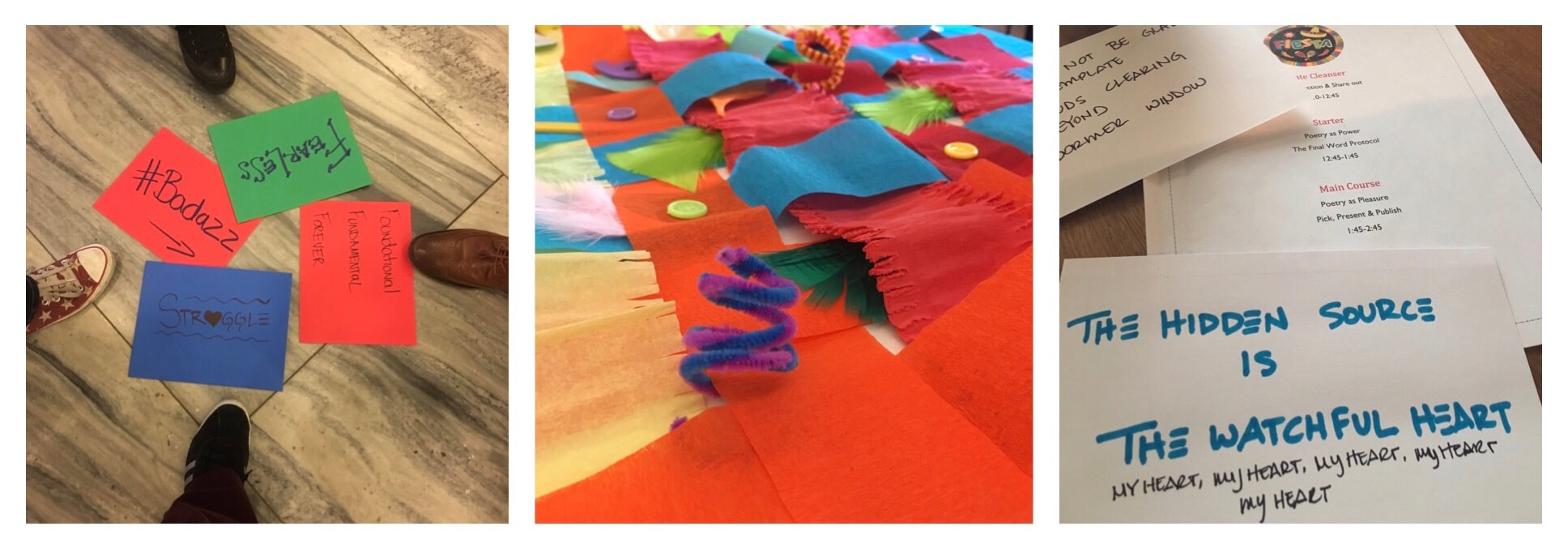|
Putting aside work so we can play, as a team.
It’s Friday afternoon. We're at the Metropolitan Museum of Art (the Met). Our colleague, Brian, is leading CPET’s senior staff in a playful experience where we explore bits of the museum guided by a podcast. At least one of us is thinking, I don’t have time to just have fun right now. My time could be better spent getting work done at the office. Brian counts down, “3, 2, 1...begin,” and we all press play and follow our ears. We are prompted by Nate DiMeo of The Memory Palace: Met Residency: A Scavenger Hunt and If You Have to Be a Floor.
“We’re going on a scavenger hunt, you and me. I will tell you things to look for. You will find them.” We wander. We wonder. We walk. At times we cross one another’s path and other times I look up to find I’m in my own corner after DiMeo says, “Find me something useful, something that does a job, that stores something…that lights something on fire…find me a glass or a platter or a helmet…find me a useful thing. Something more beautiful than it has any need to be and stop for a moment, and gaze upon it."
At one point, we were all standing in different spots across a small space – Gallery 719 (The Alexandria Ballroom) at the Met, headphones in our ears, eyes wandering from floor to furniture to windows and back down again as stories come alive in our ears. Out of the corner of my eye, I notice Brian smiling with a look of anticipation. A moment later, we all break into dance, awakening the silent room with our movement, and Brian beams with delight.
This is our third year of practicing team-building through play. Once a month for a couple of hours, we put aside our work so we can play – together. Among our experiences, we’ve attempted to Escape the Room, wandered Central Park, practiced yoga, gone bowling, played games we invented ourselves, created art, pretended to be trees, and watched a movie together.
Few would argue that play isn’t important to a child’s learning process, although there is ongoing discussion and research exploring the finer points of play, such as whether or not it’s more effective for learning if it’s adult or child-directed. How does screen-play factor into the play-learning equation? Can play exist as an end in itself, or must it be attached to learning something specific to be valued in the school setting? And so on. As educators, parents, caregivers, aunts, uncles, and former children ourselves, we each have stories about how we’ve seen and experienced play as a pathway to new learning. The President of the American Association for the Child’s Right to Play and professor at Hofstra University, Dr. Rhonda Clements, says, “It is important to maintain a healthy sense of play throughout childhood and into adulthood. Our complex society requires clear thinkers, playful attitudes, humor, and creativity for complex problem solving.”
CPET’s senior staff is responsible for leadership across the Center. With many of us out in the field for a good portion of our week, we work hard to carve out time to collaborate on small and large projects: school site PD sessions, student publications, new partnerships, conferences, communication and outreach, making sense of new mandates, developing online courses, supporting new teachers, and on and on. Work time is precious. So precious that we cannot afford to miss our play time. Each time we play, we:
Wouldn’t any one of these practices serve us well in our classrooms, faculty meetings, or school PD sessions? Play is one space you can step into with some levity and lightness! Could you start with an objective? We want to cultivate active listening in our team. Yes, absolutely. You could also start with a game -- let’s play old school Pictionary -- and then have your staff reflect after the game to find the learning gems. We use a simple set of questions with our team:
So we will continue to play, exploring our questions and our challenges, because the lessons we learn together tend to stick. Months after that visit to the Met, I reach for one of my favorite quotes from the podcast when I’m seeing my day starting to devolve into stress and pressure: “If you have to a be a room, be a room where people dance. If you have to be a floor. Be a dance floor.” |
|
The Center for Professional Education of Teachers (CPET) at Teachers College, Columbia University is committed to making excellent and equitable education accessible worldwide. CPET unites theory and practice to promote transformational change. We design innovative projects, cultivate sustainable partnerships, and conduct research through direct and online services to youth and educators. Grounded in adult learning theories, our six core principles structure our customized approach and expand the capacities of educators around the world.
|
ABOUT US
525 West 120th Street, Box 182 New York, NY 10027 416 Zankel Ph: (212) 678-3161 [email protected] Our Team Career Opportunities |
RESOURCES
Professional Articles Ready-to-Use Resources Teaching Today Podcast Upcoming PD Opportunities |
COACHING SERVICES
Custom Coaching Global Learning Alliance Literacy Unbound New Teacher Network Student Press Initiative |






















